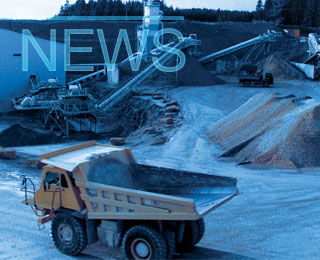Titan's turnover for the first nine months of 2012 edged ahead by 1% to €847m, but the EBITDA fell by 26.6% to €162.5m. The EBITDA fell by €36.6m in the Eastern Mediterranean, by €19.1m in South Eastern Europe and by €9.5m in Greece, but recovered by €6.6m in the USA. As a result, the group pre-tax profit fell by 65.7% to €26.1m. The net attributable profit dropped by 96.3% from €52.9m to just €2, after a €6.4m loss in the third quarter. Net debt at the end of September was 13.2% lower than a year earlier at €667m. Capital expenditure during the nine months declined by a further 18.6% to €34.2m.
Shipments of cementitous materials recovered by 3.5% in the nine months to 12Mt, while aggregates sales, which are mainly in Greece and in the United States, declined by a further 3.7% to 7.9Mt. Deliveries of ready-mixed concrete were down by 7.4% to 2.52Mm³.
Greece's relative importance to the group declined further as it fell from the second to the third largest area in terms of turnover and only 3.3% above that of the fourth, and smallest region, South Eastern Europe. The Greek and Western European turnover declined by 14.1% to €180.6m, which represented just 21.3% of the group total, again its lowest share ever. The area EBITDA came down by 22.3% to €33.2m, or 20.4% of the group total. Domestic sales volumes continued its strong declines across domestic cement deliveries, aggregates and ready-mixed concrete and prices weakened further across all three product lines. As a result of the extremely weak trading environment, bad debt provisions have now been raised to 28% of total trade receivables. Export volumes, however, did show a strong recovery, which had a beneficial effect on capacity utilisation and unit fixed costs. As a result, there were less emission rights available to sell.
South Eastern Europe represented 20.6% of turnover and 33.5% of EBITDA. The turnover declined by 4.7% to €174.8m and EBITDA fell by 26.0% to €54.5m. Lower domestic cement deliveries across the region were fully compensated for by increased exports. Some of the domestic cement price increases achieved during the first half were lost during the third quarter. €19m was spent in the third quarter to buy out the minority shareholder, but more was received in selling a minority stake in the Serbian, Kosovo and Macedonian operations to IFC.
The US turnover staged a 19% recovery to €273m, representing 32.2% of the group total compared with 27.4% a year ago. The EBITDA went from a loss of €3.2m to a €3.4m profit, which represents a €6.6m turn-round. US prices are stable at low levels and volumes now improving and are up by over 7% in the Mid-Atlantic area and by 12.4% in Florida, albeit from an extremely depressed level. A strong recovery is also being seen in aggregates deliveries and ready-mixed concrete prices appear at last to be on an upward trend.
The Eastern Mediterranean region managed to increase turnover by 1.3% to €218.7m, helped by a weaker euro. The EBITDA, however, fell by 33.9% to €71.5m to account for 43.9% of the group total, down from 49.2% a this stage last year. However the previous year's figure had been inflated by a €25m clay fee reversal in Egypt, which reduced the underlying profit decline to 14%. Egyptian cement consumption continues to grow, absorbing the additional capacity introduced, but the growth rate has slowed down to around 7%. Higher gas and electricity costs are now having a negative effect on margins and to what extent this can be passed on remains to be seen. The Turkish associate is seeing growth slowing down, but prices remain in an upward trend.

Cement demand contracting sharply in USA
Weak business and consumer confidence, amid economic uncertainty, is weighing heavily on demand ...